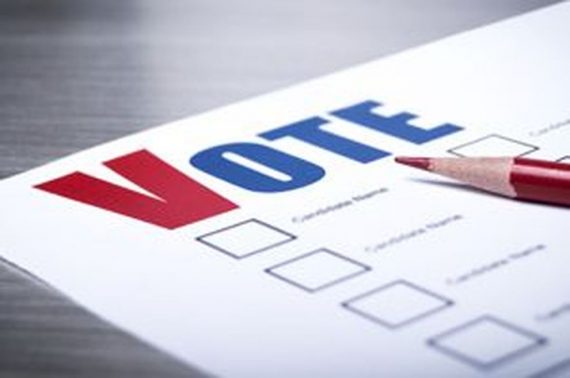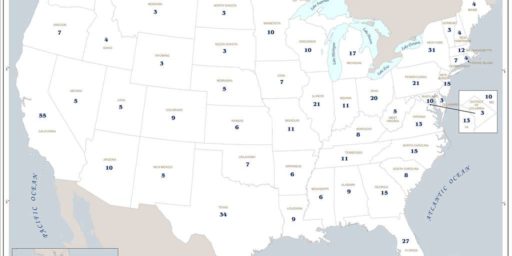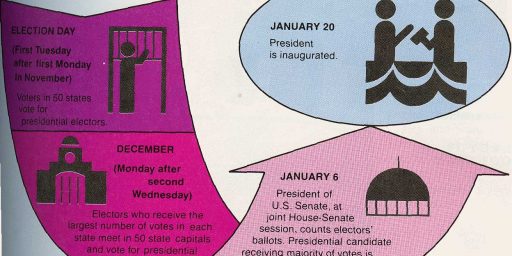Whither Electoral Reform?
Change isn't likely.

A commenter from a previous post (Scott F.) asks about the following statement that I made in Party Change is Hard: On Rules, Incentives, and Identity (and the #NeverTrump Question)
I very much support electoral reform that would actually result in a representative set of parties to reflect American political preferences. I would further like to see a host of institutional reforms to make the US government more representative in general.
OTB denizens know that I have some serious problems with US political institutions. The fundamental problem I have is that electoral outcomes do not do a very good job of representing the political preferences of the population.
Fundamentally I recognize the limitations of any governmental system. As Madison said, if men were angels, no government would be necessary. If men were angelic, they wouldn’t need rules to reign in their interests and their corruptibility. The best we can hope for is a system that tries to sincerely take into account the views of the broader population.
Our system doesn’t do a very good job of that and it needs reform.
For example, single seat districts tends to promote large parties and do no provide winning pathways to power for smaller parties (and, therefore, people get stuck in either binary choices or in casting signalling ballots). This does not have to be the case, as there are ways to structure elections that would result in fairly proportional outcomes of preferences to elected officials.
Single seat districts also problematic because they exacerbate the effects of geographic sorting (i.e, more conservative people living in rural areas and more liberal people living in urban areas) in a way that distorts representativeness. Further, they are amendable to manipulation via gerrymandering.
The House is also too small to adequately represent the population, which further contributes to the problems listed above.
The Senate presents its own problems, insofar as the political compromise that created the Union in 1789 did not take into account the way westward expansion would take place, and it certainly did not envision the population levels we now have nor the disparities between the states.
The Electoral College is an obvious problem, insofar as not only does it not work as designed (so, please, no “wisdom of the Founders rejoinders here) and it definitively can give the less popular candidate the presidency.
To get to Scott’s question, I am not optimistic about electoral reform. I have a glimmer of hope insofar as the topic has started to be raised in some parts of the discourse (like in the NYT and elsewhere). It will take time to further penetrate the public. The reality is, most people not only do not understand that there are serious flaws in our system, then have no idea that there is any other way to do any of this.
The main problem is that serious electoral reform is hard because the actors who hold the levers of power to reform are in power because of the existing rules. Reform challenges that power. Reform usually only comes about when the old guard is sufficiently threatened that the only way it sees of preserving itself is reform (like the PRI in Mexico leading up to 2000).
Electoral College reform, for example, is a non-starter even though it is in some ways the lowest hanging fruit. It definitely favors one party. Of the last five cycles (2000, 2004, 2008, 2012, and 2016) the Republicans have won the majority of the popular vote only once (2004), and yet they have held the presidency three out of those five cycles. Why in the world would they want reform?
Further, the Democrats (correctly, by the way) see themselves as the majority party in the country. As such, they are not so much interested in reform as they are in finding a way to better exploit that position. Specifically, it feels sufficiently close to them that they could better control the existing system that they aren’t campaigning on serious reform, either.
Beyond the EC, the other areas of possible reform are: increasing the size of the House and admitting more states into the Union. Those still strike me as unlikely, but they are possible.
Real reform would be changing the way we elect the House and the President and, to be honest, finding a way to reform the Senate (which would requite consensus that we simply do not have, and are unlikely to have).
My honest, professional, fear is that we only get reform as the result of crisis so severe that it leads to a breakdown or near breakdown of the current governing order.
Another main fear I have is that while most people do not understand that the system isn’t especially representative that it is that lack of representativeness that is causing much of the frustration with our politics. It is the kind of frustration that leads to politicians like Trump. It is also the kind of frustration that leads to crisis and breakdown.
In my fantasies we adopt a parliamentary system with modified bicameralism (one that lessens the influence of the Senate on truly national matters) and uses an appropriately proportional formula to elect the legislature (I would prefer a mixed-member proportional system).
But I use the word “fantasies” on purpose.
Meanwhile, what can realistically hope for is that at least the winner in 2020 wins the majority of the popular vote.






” if men were angles”
Conservatives would be obtuse?
Steve
@steve:
That’s “right”.
@steve: Dammit 😉
Thank you sincerely for your thoughtful response.
This is my honest fear as well and it breaks my heart as many will suffer when it comes to that.
@steve:
Instant Rimshot
Reforming the structures of government is the work of decades, involving literally thousands of people, if not millions. It’s more like a civil rights movement than a series of legal reforms. You need to get the message out, propose solutions, write books, write editorials, highlight the issues, speak to the media (constantly), etc.
The thing is, it would require a lot of money as well. And who spends money on politics and why?
That’s not to say it can’t be done, only a statement on the magnitude of the problem.
BTW, one thing that’s sorely needed is to expose more people to different government systems, just so they will know other systems are possible.
@Kathy:
And
This is what I have done, and will continue to do. It isn’t much but it is something.
But is that not the history of our country? The events leading up to the Civil War and the New Deal are just two examples…
@An Interested Party: The Civil Was was partial breakdown (the constitutional order continued in the North). The Depression was a crisis, but not one that lead to breakdown.
@Steven L. Taylor:
The most useful thing, perhaps, is to join, or form, an association dedicated to changing the structures of government. “Americans for a Democratic Republic” sounds non-partisan, or bipartisan.
@Steven L. Taylor: I was thinking in terms of a crisis so great that it forced big changes to our country…like you and others have talked about a new Constitutional Convention…of course such a thing would be impossible now but if things get even worse…
@Kathy: I’m older than you by a decade or two, so I remember that Marxist states used to call themselves “Democratic Republics” (as in the Democratic People’s Republic of North Korea). It may not resonate as well as you would hope for another 15 or 20 years (about the time I will give Fox News to last on it’s current business model, BTW).
@Just nutha ignint cracker:
I missed it completely.
And now I’m laughing so hard. It’s terrible when the name you pick is disqualifying off the bat.
@Kathy: maybe try some words that seem happy and optimistic, like, idk, Shining Path. 🙂
@Teve: Yeah! That’s the ticket!! 🙂
@Just nutha ignint cracker: There were pretty horrible, but “Sendero Luminoso” is one of the better guerrilla group names.
Although my all time favorite will always be, ¡Alfaro Vive, Carajo! (Alvaro lives, dammit!)